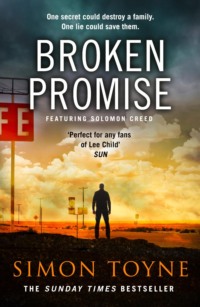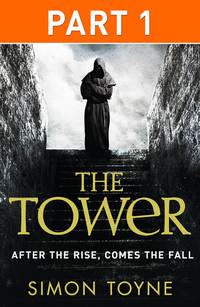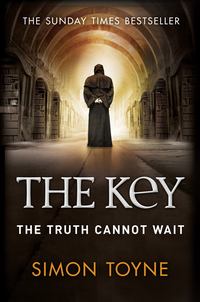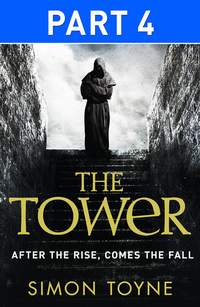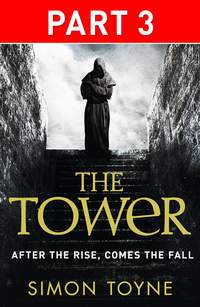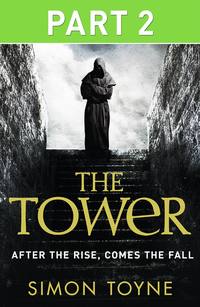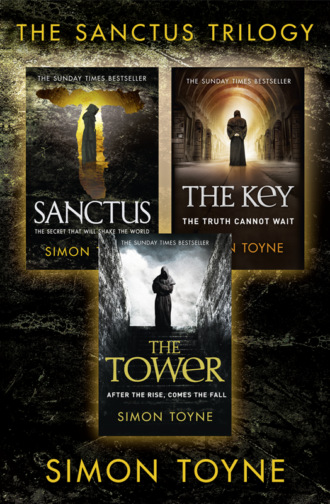
Полная версия
Bestselling Conspiracy Thriller Trilogy: Sanctus, The Key, The Tower
Arkadian took another snap then examined the scar close up. It did look exactly like a fallen cross. He pulled back, searching for meaning in the pattern of incisions. ‘Have you seen anything like this before?’
Reis shook his head. ‘My guess is some kind of initiation thing. But most of these scars aren’t fresh, so I don’t know how relevant they are to his jumping.’
‘He didn’t just jump,’ Arkadian said.
‘What do you mean?’
‘With most suicides, death is the principal objective. But not with this guy; his death was somehow … secondary. I think his primary motive lay elsewhere.’
Reis’s eyebrows disappeared beneath his hair. ‘If you throw yourself off the top of the Citadel, death has got to be fairly high on your agenda.’
‘But why climb all the way to the top? A fall from almost any height would have been enough.’
‘Maybe he was scared of winding up crippled. Lots of half-hearted suicide bids end up in the hospital rather than in here.’
‘Even so, he didn’t need to struggle to the very top. He also didn’t need to wait. But he did. He sat there, for God knows how long, in the freezing cold, bleeding from multiple wounds, waiting for morning. Why did he do that?’
‘Maybe he was resting. A climb like that is going to wipe anyone out; he would have been losing blood all the way up. So maybe he got to the top, collapsed from exhaustion, and the sun eventually revived him. Then he did it.’
Arkadian frowned. ‘But that’s not how it happened. He didn’t just wake up and topple off the mountain. He stood there with his arms outstretched for at least a couple of hours.’ He mimicked the pose. ‘Why would he do that if he just wanted to end it all? I’m pretty sure the public nature of his death is significant. The only reason we’re standing here having this conversation is because he waited until there was an audience. If he’d pulled this little stunt in the middle of the night I doubt whether it would even have made the news. He knew exactly what he was doing.’
‘OK,’ Reis conceded. ‘So maybe the guy didn’t get enough attention when he was a kid. What difference does it make? He’s still dead.’
Arkadian considered the question.
What difference did it make?
He knew his boss wanted the whole thing dealt with quickly and painlessly. The politic move would be to ignore the natural curiosity he’d been born with and stop asking difficult questions. Then again, he could just turn in his badge and sell holiday apartments or become a tour guide.
‘Listen,’ he said, ‘I didn’t ask to be put on this case. Your job is to establish how someone died. Mine is to work out why, and in order to do that it’s important to try and understand this guy’s mindset. Jumpers are usually victims – people who can’t cope any more, people who take the path of least resistance to death. But this guy had courage. He wasn’t a classic victim, and he damn sure didn’t take the path of least resistance. Which makes me think his actions meant something to him. Maybe they meant something to someone else too.’
28
Athanasius hurried up the corridor after the Abbot, their personal haloes brightening with every step they took.
‘So tell me,’ the Abbot said, without breaking stride, ‘who has made contact from the investigation?’
‘An Inspector Arkadian has been assigned to the case,’ Athanasius replied breathlessly. ‘He has already requested an interview with someone who might have information on the deceased. I told our brothers on the outside to say that the death was a tragedy and we would do everything we could to assist.’
‘Did you say whether he was known to us?’
‘I said there were many people living and working inside the Citadel and we would endeavour to discover if any of them were missing. I wasn’t sure whether or not we wanted to claim him as ours at this point, or whether you would prefer us to remain distant.’
The Abbot nodded. ‘You did well. Inform the public office to maintain the same courteous degree of cooperation, for now. It may be that the question of Brother Samuel’s body will resolve itself without our interference. Once the authorities have completed the post-mortem and no family members come forward to claim the body, we can step forward and offer to take it as a gesture of compassion. It will show to the world what a loving and caring church we are, one prepared to embrace a poor, wretched soul who sought to end his life in such a lonely and tragic way. It will also bring Brother Samuel back to us without our having to admit kinship.’
The Abbot stopped and turned, fixing Athanasius with his sharp, grey eyes.
‘However, in the light of what you have just read we must also be vigilant. We must leave nothing to chance. If anything unusual is reported, anything at all, then we must be ready to get Brother Samuel’s body back immediately, and by any means necessary.’ He stared at Athanasius from beneath his beetled brows. ‘That way, if some miracle does come to pass and he rises again, he will at least be in our custody. Whatever happens, we cannot let our enemies take possession of his body.’
‘As you wish,’ Athanasius replied. ‘But surely if what you have just shown me is the only remaining copy of the book, who else would know of the …’ he hesitated, not quite sure how to describe the ancient words scratched on the sheet of slate. He didn’t want to use the word ‘prophecy’ because that would imply that the words were the will of God, which in itself would be heresy. ‘Who else could know the specifics of the … prediction …?’
The Abbot nodded approvingly, picking up on his chamberlain’s caution. It confirmed to him that Athanasius was the right man to handle the official side of the situation; he had the political sophistication and the discretion for it. The unofficial side he would handle himself. ‘We cannot simply trust that the destruction of all the books and the people who carried them has also destroyed the words and thoughts they contained,’ he explained. ‘Lies are like weeds. You can grub them up, poison the root, burn them away to nothing – but they always find a way to return. So we must assume that this “prediction”, as you wisely refer to it, will be known in some form to our enemies, and that they will be preparing to act upon it. But do not worry, Brother,’ he said, laying a hand heavy as a bear’s paw on Athanasius’s shoulder. ‘We have withstood far more than this in our long and colourful history. We must simply do now as we have always done: stay one step ahead, pull up the drawbridge and wait for the outside threat to withdraw.’
‘And if it does not?’ Athanasius asked.
The hand tightened on his shoulder. ‘Then we attack it with everything we have.’
29
Reis reached across the monk’s body to a point at the top of the sternum, pressed down firmly with a long-handled scalpel and drew the blade smoothly down through the flesh, clear to the pubic bone, carefully following the line of the existing scar. He completed the Y-incision by making two more deep cuts from the top of the one he had just made to the outer edge of each of the monk’s shattered collarbones. Finally he cut away the skin and muscle from the monk’s chest and folded it open, revealing the ruined ribs beneath. At this point he would usually need surgical shears or the Stryker saw to cut through the cage of bone that protected the heart, lungs and other internal organs, but the massive impact of the landing had done most of the work for him. With just a few ligament cuts he managed to gain access to the chest cavity.
‘Tap the square for me, would you,’ Reis said, nodding towards the monitor. ‘Got my hands full here.’
Arkadian looked at the bloody section of ribs Reis was clutching and restarted the recording.
‘OK,’ Reis said, the jaunty tone back in his voice, ‘first impressions of the internal organs are that they are surprisingly well preserved, considering the impact. The ribs clearly did their job, even if they were all but destroyed in the process.’
He laid the ribcage down in a stainless-steel tray then made some well-practised cuts inside the body cavity to detach the larynx, oesophagus and ligaments connecting the major organs to the spinal cord before lifting the entire block out in one piece and transferring them to a wide metal container.
‘The liver shows some evidence of haemorrhaging,’ he said, ‘but none of the major organs are particularly pale so he didn’t bleed out. The subject probably died of systemic organ failure following massive trauma, which I’ll confirm once I’ve run the tox and tissue tests.’
He carried the container to an examination bench by the wall and started taking routine measurements of the liver, heart and lungs, as well as tissue samples from each.
Arkadian looked up at the TV in the corner and was once again confronted by the eerie sight of the man now lying in pieces in front of him standing proud and very much alive on the summit of the Citadel. It was the footage all the networks were now using. It showed the monk shuffling towards the edge. Glancing down. Tipping forward, then suddenly dropping from view. The camera jerked downwards and zoomed wide as it tried to follow the fall. It tightened back in, losing focus as it found him again and struggled to keep him in frame. It was like watching the Zapruder film of the Kennedy assassination, or the footage of the planes hitting the Twin Towers. There was something momentous about it, and deeply terrible. He couldn’t take his eyes off it. At the last moment the camera lost him again and pulled wide just in time to reveal the base of the mountain and the crowds of people on the embankment recoiling in shock from where the body had hit the ground.
Arkadian dropped his gaze to the floor. He replayed the sequence in his head over and over, piecing together the glimpsed fragments of the monk’s fall …
‘It was deliberate,’ he whispered.
Reis looked up from the digital scales currently displaying the weight of the dead monk’s liver. ‘Of course it was deliberate.’
‘No, I mean the way he fell. Suicide jumps are usually pretty straightforward. Jumpers either flip over backwards, or launch themselves forward and tip over head first.’
‘The head’s the heaviest part of the body,’ Reis said. ‘Gravity always pulls it straight down – given a long enough fall.’
‘And a fall from the top of the Citadel should be plenty long enough. It’s over a thousand feet high. But our guy stayed flat – all the way down.’
‘So?’
‘So it was a controlled fall.’
Arkadian went to the stainless-steel tray holding the cassock. He grabbed a set of tongs and peeled open the stiff material until he found one of the sleeves. ‘Look. Those rips you found at the wrists? They were for his hands. It meant he could pull his robe tight against his body – like a kind of wing.’ He dropped the sleeve and sorted through the grisly folds until he found the other cuts a few inches above the hem. ‘And these were for his feet.’ He dropped the material back down and turned to Reis. ‘That’s why he didn’t fall head-first. He didn’t jump off the mountain – he flew off it.’
Reis looked across at the broken body under the examination lights. ‘Then I’d say he really needs to work on his landings.’
Arkadian ignored him, following this new thought. ‘Maybe he thought he could reduce the speed of the fall enough to survive it. Or maybe …’
He pictured the monk again, his arms stretched out, his body tilted down, his head held steady, as if focusing on something, as if he was …
‘Aiming.’
‘What?’
‘I think he was aiming for a specific spot.’
‘Why on earth would he do that?’
It was a good question. Why aim somewhere if you were going to die wherever you landed? But then, death wasn’t his primary concern, it wasn’t nearly as important as … witnesses. ‘He was aiming because he wanted to land in our jurisdiction!’
Reis’s brow furrowed.
‘The Citadel is a state within a state,’ Arkadian explained. ‘Anything that side of the moat wall belongs to them; anything this side is our responsibility. He wanted to make sure he ended up on our side of the wall. He wanted all this to happen. He wanted public investigation. He wanted us to see all these cuts on his body.’
‘But why?’
‘I have absolutely no idea. But whatever it is, he thought it was worth dying for. His dying wish, literally, was to get away from that place.’
‘So what are you going to do when some big religious cheese comes calling, asking for his monk back? Give them a lecture on jurisdiction?’
Arkadian shrugged. ‘So far they haven’t even admitted he’s one of theirs.’
He glanced over at the gaping body of the monk, the body cavity now empty, the surgically precise scars round his neck, legs and arms still visible. Maybe the scars were some kind of message, and whoever came forward to claim the body would know what they meant.
Reis picked up a cardboard container from underneath the examination table, restarted the recording, and began squeezing the contents of the monk’s stomach into it. ‘OK,’ he said. ‘The major intestine contains very little, so our friend’s last supper wasn’t exactly a banquet. Looks like the last thing he ate was an apple and maybe some bread a while before that, which I’ll label and send for analysis. The stomach contents appear to be largely undigested, suggesting that his digestive system had wholly or partially shut down, indicating a high degree of ante-mortem stress. Wait a minute,’ he said, as something shifted inside the slippery membranes between his fingers. ‘There’s something else here.’
Arkadian stepped over to the table as something small and dark dropped into the soup of apple pulp and gastric juices. It looked like a curled-up strip of overcooked beef. ‘What on earth is that?’
Reis picked it up and moved across to the sink, knocking the long arm of the tap with his elbow and holding the object under the stream of water.
‘It appears to be a small strip of leather,’ he said, laying it down on a tray lined with a paper towel. ‘It was rolled up, maybe to make it easier to swallow.’ He took a set of tweezers and started opening it out.
‘He was missing a belt loop from his cassock, wasn’t he?’ Arkadian whispered.
Reis nodded.
‘I think we just found it.’
Reis moved it alongside a centimetre scale etched into the surface of the tray. Arkadian sent another picture to the case file. Reis flipped it over so he could photograph the other side and all the air seemed to be sucked from the room.
Neither of them moved.
Neither of them said anything.
Arkadian raised the camera.
The click of the shutter snapped Reis out of his trance.
He cleared his throat.
‘Having unrolled and cleaned the leather object, something appears to be scratched on its surface.’
He glanced up at Arkadian before continuing.
‘Twelve numbers, seemingly random.’
Arkadian stared down at them, his mind already racing. The combination for a lock? Some kind of code? Maybe they referred to a chapter and verse from the Bible and would spell out a word or a sentence that might shed light on things, possibly even the identity of the Sacrament. He checked the numbers again. ‘They’re not random,’ he said, reading the sequence from left to right. ‘Not random at all.’
He looked up at Reis.
‘That’s a telephone number,’ he said.
II
Unto the woman he said, I will greatly multiply thy sorrow and thy conception; in sorrow thou shalt bring forth children; and thy desire shall be to thy husband, and he shall rule over thee.
Genesis 3:16
30
The primal screams echoed round the bright room with a desperate, animal quality that seemed out of place in the sleek modern setting of the New Jersey hospital.
Liv stood in the corner, watching Bonnie’s face contort in pain. Her phone had woken her a little after two in the morning, dragging her out of bed, into her car, and south on I-95 with all the empty trucks making their way out of New York City. It had been Myron; Bonnie’s waters had broken.
Another lung-deep scream tore through the room and she looked across at Bonnie squatting naked in the centre of the room, howling so hard that her face had gone purple and the cords in her neck stood out like high-tension cables. Myron held on, supporting one arm, while the midwife held the other. The howl ebbed slightly, making way for the incongruous sound of waves lapping against a beach. They flowed gently from a portable boom box in the corner.
In Liv’s nicotine-starved mind the supposedly soothing sounds of the seashore morphed into the tormenting crackle of cellophane being ripped off a fresh pack of Luckies. She craved a cigarette more than she had ever desired anything in her life. Hospitals always had that effect on her. The very fact you were expressly forbidden to do something made it almost irresistible to her. She was the same in churches.
Bonnie’s scream rose again, this time something between a moan and a growl. Myron stroked her back and made shushing noises like he was trying to calm a child who had woken from a terrible nightmare. Bonnie turned to him and in a low voice made raw from screaming panted a single word: ‘Arnica.’
Liv reached gratefully for her notebook to log the request and the time it was made. Arnica was also known as wolf’s bane or mountain tobacco and had been used since the dawn of time as a herbal remedy. Liv often used it herself to reduce bruising; it was also thought to alleviate the trauma of a long drawn out and painful childbirth. She found herself sincerely hoping this would prove to be true as she watched Myron fumbling with a small vial containing the tiny white sugar pills. The screaming started again and rose in pitch as another contraction arrived.
For God’s sake, take the Pethedine, Liv thought.
An advocate of the healing properties of plants she may have been; a masochist she most definitely was not. Bonnie’s screaming soared to a new zenith and her hand shot out to grab Myron, knocking the entire contents of the blue box on to the shiny vinyl floor.
Liv’s cell phone rang in her pocket.
She felt for the ‘off’ button through the thick cotton of her cargo pants and pressed hard, hoping to catch it before it rang again. No one gave the slightest indication they even remembered she was there. She fished the phone out and glanced down at the scratched grey screen, made sure it was definitely off, then returned her attention, just in time, to the unfolding story in the room.
Bonnie’s eyes rolled back in her head and her heavily pregnant form crumpled to the floor, despite the best efforts of Myron and the midwife to keep her upright. Instinctively, Liv dived for the emergency cord dangling by her side and pulled as hard as she could.
Within seconds the room filled with orderlies fluttering around Bonnie like moths, crunching homeopathic pills underfoot. A trolley appeared from nowhere and she was wheeled from the room, away from Liv and the gentle music of the shoreline, down the hallway to another room full of the latest drugs and clinical equipment.
31
Ruin Homicide shared office space with the Robbery Division on the fourth floor of a new glass block built behind the carved stone façade of the original police building. The office was open-plan and noisy. Men in shirtsleeves perched on the edge of desks and tipped back in chairs as they talked loudly into phones or with each other.
Arkadian sat at his desk with his hand clamped to his ear, trying to listen to the answer-phone message on the number he’d just called. A woman’s voice. American. Confident sounding. Direct. Late twenties or early thirties. He hung up rather than leaving a message. You never got any information by leaving messages. Best just to keep on trying until whoever you were calling got curious and picked up.
He dropped the handset into its cradle and tapped the space-bar on his keyboard to banish the screensaver. The photos from the examination table appeared. With his eyes he traced the neat scars snaking across the dead monk’s body, strange lines and crosses that ultimately formed one giant question mark.
Since the post-mortem, the mystery of the monk’s identity had deepened. The Citadel still hadn’t claimed him as one of their own, and all the regular methods of victim identification had so far drawn a blank. His fingerprints had come back unknown. Ditto his dental records. His DNA swabs were still working their way through the labs, but unless the dead man had been arrested for a sex crime, a homicide or some kind of terrorist activity it was unlikely he was going to show up on any of those databases either. And Arkadian’s boss was starting to lean on him for some kind of progress report; he wanted to draw a line under this thing. So did Arkadian, but he wasn’t going to whitewash it. The monk belonged to someone. It was his job to find out whom.
He glanced at the clock on the far wall. It was now a little after one in the afternoon. His wife would just be getting in from the school where she helped out three days a week. He dialled his own number and clicked on the lower left corner of his computer screen to open up a browser window while he listened to it connecting.
His wife picked up on the third ring. She sounded breathless.
‘It’s me,’ Arkadian said, tapping ‘Religion’ and ‘Scars’ into the search box and hitting return.
‘Heeeey,’ she said, drawing out the middle of the word in a way that still got him twelve years after he’d first heard it. ‘You coming home?’
Arkadian frowned as the results came back, all four hundred and thirty-one thousand of them.
‘Not yet,’ he said, scrolling through the first page.
‘Then what are you calling for, getting a girl’s hopes up?’
‘Just wanted to hear your voice. How was work?’
‘Tiring. You try teaching English to a roomful of nine-year-olds. I must’ve read The Hungry Caterpillar at least a couple of hundred times. Though by the end, there was one kid I swear could read it better than me.’
He could tell from her voice she was smiling. She was always happiest when she’d spent the morning in a room full of kids. The realization also made him feel sad.
‘Sounds like a know-all,’ he said. ‘You should get him to read it to the class next time, see how he copes under pressure.’
‘It’s a girl, actually. Girls are cleverer than boys.’
Arkadian smiled. ‘Yes, but you end up marrying us. So you can’t be all that bright.’
‘But then we divorce you and take all your money.’
‘I don’t have any money.’
‘Oh well … then I guess you’re pretty safe.’
He clicked on a link and scrolled through pictures of tribesmen with raw wounds slashed red into ebony flesh. None of them matched the scars on the monk.
‘So what case are you working?’ she asked. ‘Anything gruesome?’
‘The monk.’
‘You find out who he is yet, or can’t you say?’
‘I can’t say because I don’t know.’ He clicked back to the results page and opened a link dealing with stigmata, the unexplained phenomenon of wounds similar to those Christ suffered during his crucifixion appearing on ordinary people.
‘So you going to be late?’
‘Too early to tell. They want to get this one squared away.’
‘Which means “yes”.’
‘Which means “probably”.’
‘Well … just be careful.’
‘I’m sitting at my desk doing Google searches.’
‘Then come home.’
‘I always do.’
‘Love you.’
‘You too,’ he whispered.
He looked up at the office, humming with noise and attitude. Most of the people currently occupying it were either divorced or well on their way, but he knew that would never happen to him. He was married to his wife, not the job; and even though that choice had meant he’d never been given the sexy, high-profile cases from which careers and reputations were made, he didn’t mind. He wouldn’t swap his life with any of them. Besides, there was something about this suicide that made him feel he might just have caught a live one. He clicked randomly on one of the stigmata websites and started to read.


